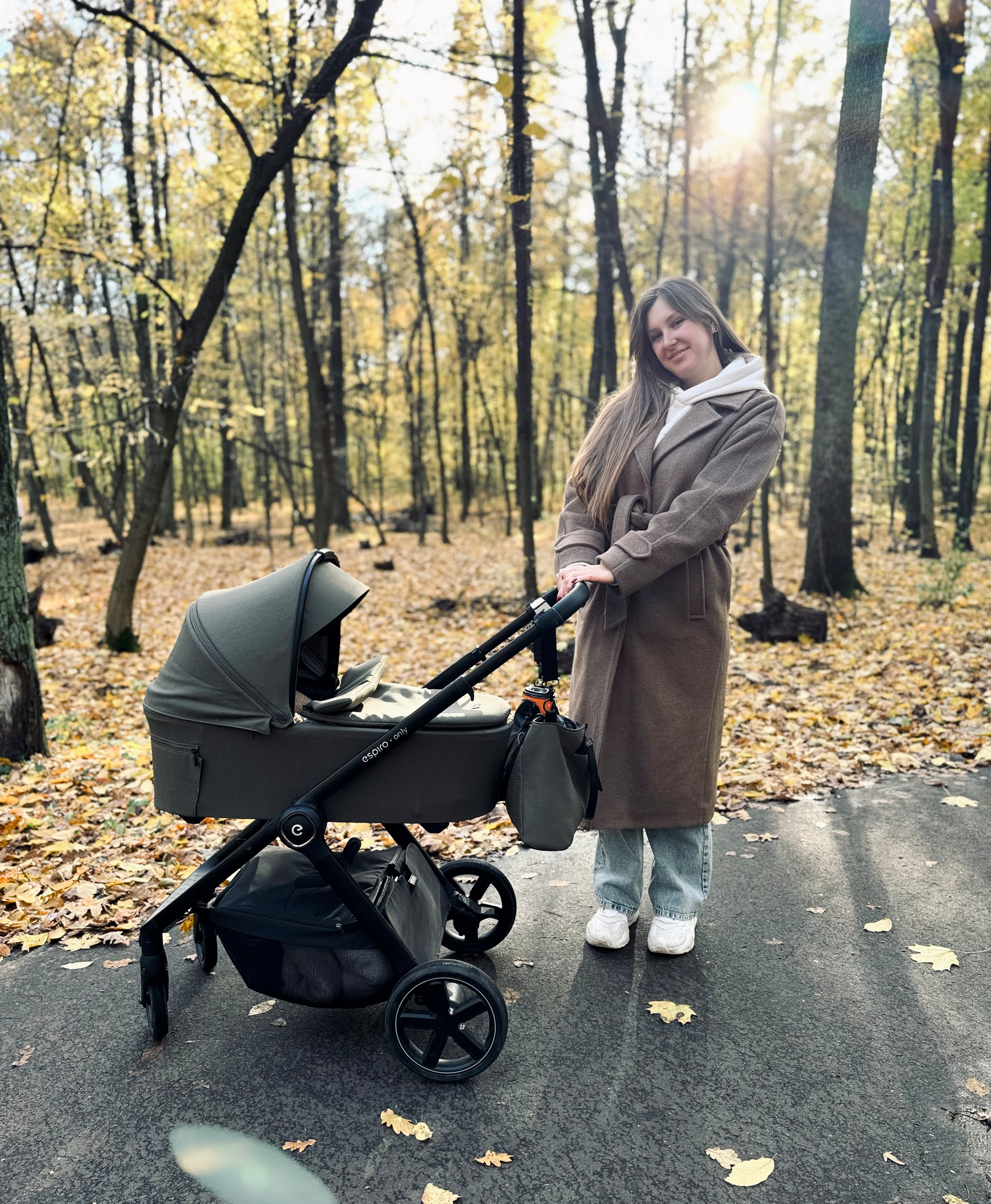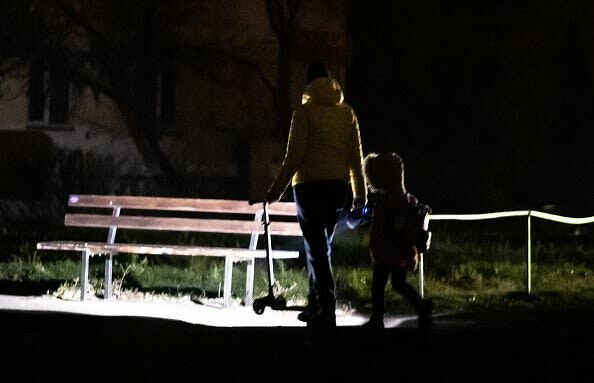
Editor’s Note:
This is Myroslava’s first article after returning from maternity leave on Monday.
She holds her small son in her arms as she writes, so you can read about the events in Ukraine. Over much of the last year she’s been on paid maternity leave, and we continue to support her as she transitions back to work.
Want to support our philosophy around work? Upgrade for full access to our stories or or use our tip jar below.
I want to sleep. I’m exhausted, hungry, and cold.
For the first half of the night, my little 4-month-old son kept waking me up, and for the second half – the Russians, who attacked Ukraine again, did the same.
For the next four hours, our building will have electricity, the energy workers reassure me. I’ll have enough time to go outside so my little Ustym can sleep at least a bit.
I put him in the stroller, and opened the door to go out into the stairwell.
In front of me is a thick wall of blackness.
The lights went out off-schedule.
I’m in despair. Ustym starts crying. And I came very close to getting trapped in the elevator.
Ukrainian mothers learn to heat baby formula without electricity, to wash an infant when there’s no water, and to calm them in the darkness amid the sound of sirens.
Behind the dry reports about strikes on the energy system stand real families who manage to maintain a normal routine every day. For the third autumn in a row, Russians are trying to destroy Ukraine’s energy infrastructure.
Ukraine is bracing for a winter with widespread outages, a reminder of how much strength it takes to stay tender when there’s darkness all around.
We would normally have a paywall for this story right, but Tim decided to remove it so you can all read Myroslava’s firsthand account of what it’s like to be a mother in Ukraine today. Help support our journalism by upgrading your subscription or hitting our tip jar.
The last massive Russian missile attack took place on October 30. As a result, rolling blackouts were introduced across almost all of Ukraine — and they’re still in effect.
I’m used to preparing for hard winters, but 2023 – the first winter after the start of the full-scale invasion – was the most terrifying ordeal. The lights went out without warning, and every time we got in the elevator on the 14th floor, we crossed our fingers that it wouldn’t stop working.
Without electricity, the water pumps didn’t work, and the water didn’t reach that high. Our whole life revolved around carrying buckets: to wash our hands, take a shower, or flush the toilet.
When it became completely unbearable, we moved to the sixth floor, and it seemed like paradise. It was still dark, but at least water flowed, even if it was cold.
“People adapt to the new reality quite quickly, but in the background, it greatly raises the level of anxiety, problems with sleep appear, with rest in general,” child psychologist Mariia Voloshyna told The Counteroffensive.
This is especially true when you have an infant in your arms.
Now my morning begins when Ustym decides to wake up, usually at 6:30 a.m. Before the blackouts, this seemed like a simple routine: I’d try to convince him to sleep a bit more, usually unsuccessfully, he’d smile, and we’d go about our morning routine, with me changing his diaper, wiping his eyes and ears, massaging his legs, and, of course, drinking coffee to power all the above.
But everything is different now. The first thing I do is check if there’s electricity. Sometimes it’s still dark at 7 a.m., and I can’t even show him that the day has come. Babies can confuse day with night, so I have to do something to signal it’s daytime: turn on flashlights, get out bright toys, and speak louder.
As hard as it is to live without coffee, making it is a challenge, too. I take out a portable camping stove, feeling like I’m not in the 21st century but somewhere in a survival camp.
Then I have to jump through hoops to make sure Ustym’s formula is ready. It needs to be heated to a precise temperature, and even a few degrees can make a big difference. I boil water, cool it to room temperature, pour a little water into a bottle, add the mixture, shake it to remove any lumps, and add the rest of the water. If the water temperature is incorrect, the powder won’t dissolve. In two months, we’ll start solid foods, and I’m already worrying about how I’ll make puree or porridge without electricity, without a blender, without a stove.
During a blackout, our brain reacts more strongly than the situation demands. That’s because in the darkness, an ancient survival instinct switches on: We’re on alert because we can’t see potential threats. Added to this is a feeling of loss of control and uncertainty, which intensifies fear. This causes us to imagine the worst, and others’ panic only feeds this anxiety. All of this is a natural reaction of the brain, which is trying to protect us from the unknown.
During a massive blackout in New York in 1977, for instance, an ordinary power outage turned into a wave of panic and disorder – a prime example of how fear of darkness can overtake even a large city. Looters flooded the city, robbing home appliance stores, then moving on to car dealerships, jewelry stores, clothing stores, and supermarkets.
Darkness isn’t always the enemy, though. Our brain works like a natural light meter, accumulating energy during the day, and preparing us for rest at night. Our bodies are designed to live in nature’s rhythm. Dark evenings can be a time of restoration – an opportunity to simply be, to hear ourselves, while allowing the sun to recharge our internal battery again during the day.
My friend Nadiia Samoilova has a baby son who’s 5 months old, slightly older than Ustym. The hardest thing for her, and probably for every mom who lives in a high-rise, is simply going out for a walk.
“I walk with a sleepy child at the same time every day, that’s when he sleeps well. Once I tried to carry down the stroller, the baby was in my other hand. It was very difficult because the stairs are narrow and the stroller is bulky,” Nadiia told The Counteroffensive.
With the outages, heating also disappears, meaning you have to dress your child warmer, use a heating pad, and constantly worry about him or her getting cold and sick.
But what I fear most is something else – getting stuck in the elevator. Every time I go up, I cross my fingers, hoping to make it to my floor before the power can go out. I always have to keep a supply of formula and warm blankets with me, just in case I have to keep Ustym warm and calm in the darkness.
That’s why I often wait for my husband so he can carry down the stroller and we can walk outside together when there’s a threat of outages, since a child absolutely needs to breathe fresh air. And during the day, I can take the stroller out onto the balcony.
It’s easier for those who have their own house. Maryna Shatskykh lives outside Kyiv and she’s completely independent from electricity. When she was pregnant with her first child, in spring 2023, her husband set up autonomous lighting: solar panels, an inverter, with charging stations, and he even drilled their own well for water.
“Even though I’m not dependent on electricity, I feel helpless because of the missiles and Shahed drones,” Maryna said.
Even when it seems like you’re in control of the situation, your body is in constant tension. A child feels this even more acutely, said Voloshyna, the psychologist. Even if a child doesn’t remember the darkness, the cold, or the sirens’ sounds when they get older, their body will preserve these memories. Stress leaves an imprint, usually in the form of anxiety, sensitivity to noises, and restless sleep.

Infants are extremely vulnerable to environmental changes, according to Voloshyna. They react to stress with crying, overstimulation, and changes in routine. And at the same time, they pick up on their mother’s state perhaps more than anything else. If she’s calm, they will calm down, too.
“The best protection... is the presence of a loving adult nearby. If a child is calmed, hugged, and supported, the risks of long-term negative impact are greatly reduced. A calm voice of mom/dad can help, favorite songs and toys,” Voloshyna said.
I know from experience that this is true. If I’m anxious, I know that Ustym will be anxious too, and he’ll sleep poorly and cry. So I always try to calm down, breathe in and out, hug him, and explain that mom is upset not because of him, but because of how circumstances are unfolding.
Somewhere deep in my soul, I feel guilt that my son has to live in wartime, since it was, after all, my husband and I who chose to bring him into such a world.
Nadiia has an entirely different opinion, though: How can you feel guilty for being attacked?
We often talk about resilience – how Ukrainians have learned to live without electricity, water, or heat. But true resilience isn’t a supply of batteries and candles; it’s the ability to remain tender and warm when you’re scared.
It’s singing a lullaby when the siren wails, and smiling at your child even when everything inside you is paralyzed with fear. That’s what I try to do every day; I refuse to let the war take away my son’s sense of peace.
Because when the light goes out, something else remains: the warmth of a mother’s hands. And maybe it’s precisely this warmth that can one day make things right in the world.
Editor’s Note:
This is Myroslava’s first article after returning from maternity leave on Monday.
She holds her small son in her arms as she writes, so you can read about the events in Ukraine. Over much of the last year she’s been on paid maternity leave, and we continue to support her as she transitions back to work.
Want to support our philosophy around work? Upgrade for full access to our stories or or use our tip jar below.
NEWS OF THE DAY:
By: Oleksandra Khelemendyk
LESS RUSSIAN GAS IN EUROPE: Polish President Karol Navrocki agreed to facilitate the sale of U.S. gas to Slovakia to decrease its reliance on Russian resources. Poland has diversified its gas supplies, so it can deliver American LNG across Europe.
Slovakia remains dependent on Russian gas and will not be able to halt its imports in the short term. The war in Ukraine, along with rising economic pressure on Russia and its allies, is giving Europe an opportunity to boost its energy security and strip Russia of its energy leverage in the region.
RUSSIA PLANS FULL-SCALE NUCLEAR TESTS: Russian Defense Minister Belousov has called for the immediate preparation for full-scale testing of Russia’s nuclear arsenal, Hromadske reported, citing Russian media.
In October, Trump announced that the Pentagon was preparing for nuclear weapons tests and declared his intention to withdraw from the nuclear arms control treaty with Russia, citing Moscow’s violations of the agreement.
Putin stated that Russia must monitor the actions of the treaty’s participants and take appropriate measures.
S. AFRICANS TRAPPED IN DONBAS SEEK HELP: South Africa will investigate how 17 of its citizens joined the army to fight the war in Ukraine, after the men called for help to return home, President Cyril Ramaphosa said. The side they were fighting on is not specified, but Russia is known for the recruitment of foreign mercenaries, including from Kenya, India, Nepal and Sri Lanka.
South Africa wants to remain a non-aligned state in the war and maintain close relations with Russia, its fellow member of the BRICS group. South African law prohibits citizens from fighting for foreign armies without being authorized by the state.
DOG OF WAR:
A cute dog accompanied Sasha on her way from Kyiv to Zaporizhzhia and made friends with everyone in the train compartment.
Stay safe out there.
Best,
Myroslava






